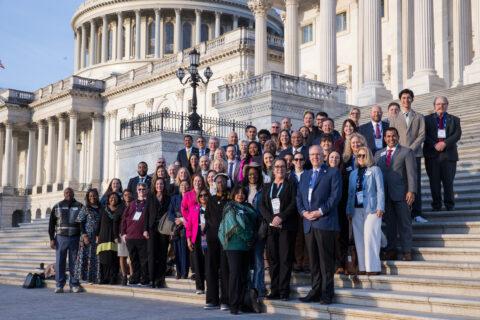The Earned Income Tax Credit (EITC) is a federal tax credit program that is accessible to low- and moderate-income workers. Workers may qualify for the EITC by making an adjusted gross income below a certain threshold which rises based on the number of children or other dependents they claim on their tax return. EITC can provide hundreds or thousands of dollars in tax credits, which has helped give millions of workers and their children a moment to get ahead; in 2022, the average EITC value was $2,541.
Check out the National League of Cities’ EITC Opportunity Map, to create a targeted approach to increased EITC claim rate in your community.
Volunteer Income Tax Assistance (VITA) is a program managed and financially supported by the IRS that provides free tax return filing assistance to many of the same low- and moderate-income individuals served by the EITC. VITA sites can be found in communities across the United States and are operated by IRS partners with staffing from IRS-trained and certified volunteers to guarantee a large capacity for filing while remaining free to their clients. VITA site free and accurate services can save their clients hundreds of dollars in tax preparation fees over private tax preparation services. In 2023, more than 1.3 million Americans filed their tax returns with a VITA site.
Because VITA sites and EITC have so much in common in terms of their users, techniques to bring a greater number of clients into VITA sites are a great opportunity to increase the number of EITC dollars supporting workers in your community.
A Convening of VITA Sites on New Techniques for Increasing EITC Claim Rates
On a warm Thursday in June, staff from seven VITA sites, including United Way, from Northern and Central New Jersey assembled in Flemington, New Jersey, to discuss learnings from five pilot strategies for increasing EITC claim rates among their target communities. A year earlier, these VITA site operators had committed to joining a cohort managed by the national nonprofit Social Finance, in partnership with NLC, to explore new and old strategies for increasing EITC claim rates.
To encourage participation, clients engaging with any of the following 5 strategies were offered gift cards as incentives across all five pilot strategies — whether they referred a friend, tried a new filing method or accessed services for the first time:
- Word of Mouth: VITA site operators were given gift cards to distribute to any tax clients who referred a friend to their VITA site.
- Self-File: Tax assistance clients were given the option to file their own taxes using software and a computer provided by the VITA site operator on-site.
- Geographic Expansion: VITA site operators ran temporary pop-up locations at different spots in their communities to be more accessible to clients.
- Language Access: VITA site operators used translators or multi-lingual volunteers to provide tax assistance to clients with limited English skills.
- Back Taxes: VITA site operators provided back taxes filing services to their clients in addition to their current year tax filing services.
Key Learnings on EITC/VITA Strategies
Each strategy offered meaningful benefits and surfaced valuable lessons about implementation in real-world settings.
The word-of-mouth referral program, while attracting about 100 new clients to VITA sites, posed operational challenges for VITA staff and volunteers, such as tracking down referrers to reward them with a referral incentive and verifying new client eligibility for an incentive payment. Participating sites reflected that training volunteers on the referral system earlier (e.g., in the fall) and simplifying the incentive eligibility criteria would reduce volunteer burden and make program marketing easier.
Other strategies, such as promoting self-filing methods and assistance with back taxes, were more familiar to VITA sites. With additional funding, sites were able to expand their overall capacity to implement these approaches. This was especially critical for the back taxes promotion, as some clients were still eligible to claim the 2021 Economic Impact Payment for the final time during this tax season.
A key takeaway from several strategies is the value of strong partnerships. Some participating VITA sites used funding to launch “pop-up” or hybrid services in new locations, improving geographic accessibility. This required forming new partnerships with community organizations, such as churches, libraries and municipal buildings, to host services. The most successful pop-up sites benefited from early and meaningful buy-in from host partners, which helped VITA and its collaborators recruit volunteers and promote services to new audiences.
Partnerships also played a crucial role in serving language-diverse communities. While translation services have long been available to VITA volunteers and clients, they are often limited in accessibility or effectiveness. In this project, one VITA site addressed the gap by hiring two bilingual Spanish-English community members affiliated with a community volunteer organization and training them as IRS-certified tax preparers. This approach proved highly successful. By combining cultural and linguistic competency with tax preparation expertise, these volunteers were able to support clients far more effectively than traditional translators without tax training.
Lastly, universities can be valuable partners, but without existing relationships or prior networking, it can be challenging to establish new collaborations in time to implement a strategy during the current or upcoming filing season.
Cities of all sizes can support these efforts and now is the time to reach out to the providers working within your community to hear what they have tried, what worked and what they are planning for 2026.
Implementation Partner: Social Finance is a national nonprofit organization which helps build partnerships for public good.
Social Finance Researchers: Nadine Abraham, Billy Fitzpatrick, Amber Ivey and Natalie Larkin
Explore More Financial Empowerment Opportunities
NLC’s Economic Opportunity and Financial Empowerment (EOFE) team increases city leaders’ awareness about the critical roles they can play in addressing the economic challenges financially insecure families in America’s communities face. Learn more about their work and how it can benefit your community.










